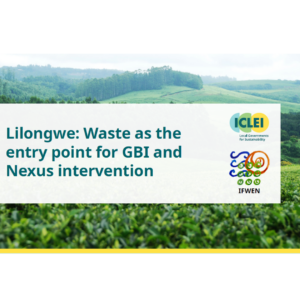

Lilongwe: Waste as the entry point for GBI and Nexus intervention
This case study showcases how waste and community engagement can be used as an entry point to food-water-energy nexus interventions.
Summary
The UNA Rivers Project in Lilongwe aimed to support river system health by preventing waste contamination. Food waste made up the majority of the contamination so the project focused on intercepting waste from a local food market. Using a gender inclusive lens, the project supported women working in the market collecting waste for composting by offering training and setting up a composting site. The project was successful in reducing waste to a certain extent. However, the project’s limitations act as a powerful lesson and illustrate the importance of multi-stakeholder engagement where stakeholders can influence the design, planning and implementation of projects, and the importance of understanding social context.

